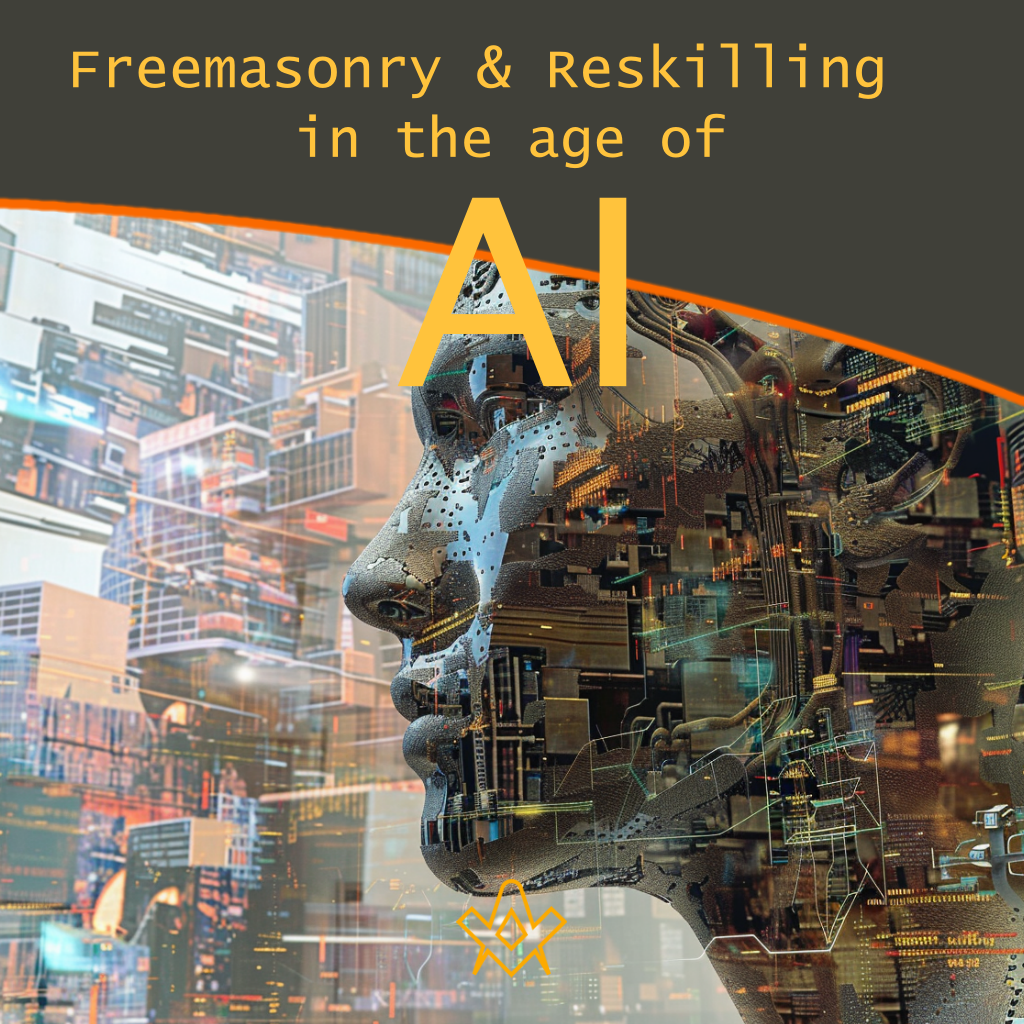Freemasonry is an ancient and brotherhood fraternity that has a long history of promoting personal growth, self-improvement, and the development of ethical values.
As an organization, Freemasons strive to support their members in their journey towards self-discovery, enlightenment, and becoming better individuals.
The Article titled “The Reskilling in the Age of AI”, Harvard Business Review [ https://hbr.org/2023/09/reskilling-in-the-age-of-ai ] contains valuable lessons that Freemasons can implement to enhance their own personal development and the growth of their fraternity.
One of the key insights from the article is the recognition of re-skilling as a strategic imperative. Freemasons can adopt this perspective and view their own personal development as a long-term strategic goal.sBy continually seeking opportunities to acquire new knowledge, skills, and perspectives, Freemasons can transform themselves into well-rounded individuals who are better equipped to contribute positively to their communities and society as a whole.
Another lesson Freemasons can learn is the importance of leadership and shared responsibility in reskilling initiatives. In the article, it is mentioned that re-skilling is not solely the responsibility of HR but rather a task that requires the involvement of every leader and manager within an organisation.
Freemasonry is built on the principles of leadership and mentorship, and members can take on the role of mentors, guiding and supporting fellow brethren in their personal development journeys. By fostering a culture of shared responsibility, Freemasons can create an environment conducive to growth and learning.
The article also emphasises the need for a change management approach when embarking on re-skilling initiatives. Similarly, Freemasons can recognize that personal growth and self-improvement require a mindset shift and a willingness to embrace change.
By understanding the importance of adapting to new ideas, acquiring new skills, and challenging preconceived notions, Freemasons can unlock their full potential and experience personal transformation.
Furthermore, the article highlights the value of partnerships and collaboration in re-skilling efforts. Freemasonic lodges already place great importance on building strong bonds of brotherhood and supporting one another.
By forging partnerships with external organizations, such as nonprofits and educational institutions, Freemasons can expand their access to resources and expertise that can facilitate their personal development journeys.
Additionally, Freemasonry as a fraternity can collaborate with other organizations to promote lifelong learning, personal growth, and the development of ethical values within society.
Additionally, the article emphasises the need to treat employees as partners in reskilling programs. Freemasonry, with its emphasis on equality and mutual respect, can apply this approach within its own ranks.
By involving all members in decision-making processes and valuing their contributions, Freemasons can foster a sense of ownership and engagement. This inclusive approach can lead to greater motivation and commitment to personal development goals.
The article also emphasises the importance of designing reskilling programs from the employee’s perspective and aligning them with their needs and aspirations.
Freemasons can adopt a similar approach by tailoring their personal development journeys to their own individual goals and aspirations.
By identifying areas for improvement, setting clear objectives, and seeking out opportunities for growth that align with their values, Freemasons can ensure that their personal development efforts are meaningful and fulfilling.
Furthermore, the article underscores the importance of dedicating adequate time and attention to re-skilling. For Freemasons, this translates to setting aside time for self-reflection, study, and engaging in ritualistic practices.sBy prioritizing personal development and committing to regular self-improvement activities, Freemasons can create a conducive environment for continuous growth and learning.
Lastly, the article emphasizes the need for measurement, evaluation, and sharing of successful practices in reskilling efforts. Freemasonry can adopt a similar approach by encouraging members to reflect on their personal development progress, sharing their learnings and experiences with fellow brethren, and studying the teachings and rituals of the fraternity to gain deeper insights.
By fostering a culture of continuous improvement and knowledge-sharing, Freemasons can inspire and support one another in their personal growth journeys.
In conclusion, the article offers valuable lessons that Freemasons can implement to enhance their personal development and the growth of their fraternity.
By embracing re-skilling as a strategic imperative, adopting a change management approach, valuing partnerships and collaboration, treating members as partners, and dedicating adequate time and attention to personal growth, Freemasons can create an environment conducive to continuous learning and self-improvement.
By incorporating these lessons into their practices, Freemasons can further enrich their personal journeys of self-discovery, enlightenment, and becoming better individuals.
Skills Set

IMAGE: The Square Magazine Digital Collection
The knowledge from the article can be valuable for individuals seeking self-improvement and development of their leadership skills, regardless of their affiliation with any specific organization. Here are some ways a citizen of the world can utilize this knowledge:
1. Recognize the importance of continuous learning: This emphasizes the need for individuals to continually acquire new skills and knowledge due to the rapid pace of technological advancements.
Embracing lifelong learning and seeking opportunities for personal growth are crucial in today’s ever-changing world.
By adopting a growth mindset and actively seeking out learning experiences, individuals can stay relevant, adapt to new challenges, and enhance their personal and leadership capabilities.
2. Take ownership of personal development: This emphasizes the shift from viewing reskilling as a mere HR function to recognizing it as a personal responsibility. Similarly, individuals should proactively take charge of their own self-improvement and leadership development.
This involves setting clear goals, identifying areas for improvement, and seeking out opportunities for growth and skill acquisition. By taking ownership of their development journey, individuals can build the necessary skills and capabilities to become effective leaders.
3. Embrace a change management approach: This highlights the importance of embracing change and adopting a change management mindset. This is applicable to personal growth and leadership development as well.
Being open to new ideas, challenging one’s own beliefs and assumptions, and actively seeking out opportunities for personal growth require embracing change.
By cultivating a mindset that welcomes and adapts to change, individuals can develop the resilience and agility needed to navigate complex and uncertain environments.
4. Foster collaboration and partnerships: This stresses the value of partnerships and collaboration in reskilling efforts. Similarly, individuals can benefit from collaborating with others to foster their own growth and development.
Seeking out mentors, joining communities of practice, and networking with like-minded individuals can provide opportunities for learning, sharing insights, and gaining support.
By actively engaging with others and building meaningful relationships, individuals can amplify their personal growth and leadership development.
5. Reflect and evaluate progress: This highlights the importance of measurement and evaluation in reskilling initiatives. Likewise, individuals can apply this approach to their own self-improvement and leadership development.
Regularly reflecting on one’s progress, identifying strengths and areas for improvement, and seeking feedback from others can provide valuable insights for growth.
By setting aside time for self-reflection and self-assessment, individuals can adjust their strategies and ensure continued progress in their personal and leadership journeys.
6. Share knowledge and experiences: Just as this emphasizes the sharing of successful practices in reskilling, individuals can contribute to the growth and development of others by sharing their knowledge and experiences.
This can be done through mentorship, coaching, public speaking, or even writing and publishing. Sharing insights, lessons learned, and approaches to personal growth and leadership can inspire and support others in their journeys.
In conclusion, the insights from these lessons can be applied by any citizen of the world for their personal growth and development of leadership skills.
By embracing continuous learning, taking ownership of personal development, embracing change, fostering collaboration, reflecting on progress, and sharing knowledge, individuals can enhance their abilities, navigate the challenges of an evolving world, and become effective leaders in their respective domains.
Article by: Nicholas J Broadway

Nicholas was initiated into Freemasonry in 1989 in Stonewell Lodge No. 9137, Essex England (UGLE) and was Master in 1995, 2011 and 2016. He also joined other UGLE craft Lodges and is a PZ in the Royal Arch Chapter.
He acquired the title of The Square Magazine in January 2020 and oversees the technical running of the digital publication.
Recent Articles: skill series
 Freemasonry and Reskilling in the age of AI The article explores the challenges and strategies organizations face in reskilling their workforce in the era of automation and artificial intelligence. It highlights the need for companies to view reskilling as a strategic imperative and involve leaders and managers in the process. The article also emphasizes the importance of change management, designing programs from the employee's perspective, and partnering with external entities. |
 Ten Central Commandments or Principles of Freemasonry Embrace the wisdom of Freemasonry's teachings in your personal journey towards self-improvement and stronger leadership. By upholding virtues of integrity, compassion, and respect, and uniting these with a commitment to continuous learning and social responsibility, inspire change. Transform yourself and the world around you, fostering a legacy of positivity and enlightenment. |
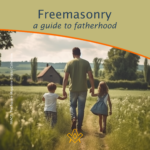 Freemasonry: A Guide to Fatherhood In the sacred halls of Freemasonry, fathers discover a hidden power to transform their parenting journey. With its timeless values, supportive community, and life-enriching teachings, Freemasonry empowers fathers to provide a moral compass, foster self-improvement, build stronger connections, and embrace the confidence and wisdom needed to navigate the complex realm of fatherhood. |
 Courage as a core value in Freemasonry Freemasonry, a revered fraternity, prioritizes virtues like honesty and charity. However, courage is foundational. From Plato to Maya Angelou, courage is vital for other virtues. Freemasonry's teachings, referencing events like Gettysburg, emphasize diverse courage forms. In today's divided world, Masons promote and exemplify courage, understanding its importance in facing challenges. |
 How Freemasonry Cultivates Ideal Entrepreneurial Traits Freemasonry's cryptic rituals hold timeless lessons for building entrepreneurial greatness. Through tests of passion, vision and skill, Masonic teachings forge ideal traits like grit, creativity and alliance-making needed to seize opportunity and elevate enterprises. The right commitment unlocks code for entrepreneurial success. |
 What you see praiseworthy in others "What you see praiseworthy in others, carefully imitate, and what in them may appear defective, you will in yourself amend". This passage of Masonic ritual (Taylors Working, Address to the w |
 How to Learn Ritual with a Learning Disorder So what do you do when faced with that little blue book? Most Masons when first looking at the ritual book can understandably be fazed – the tiny print, the missing words, the questions and answers! Learning ritual can be a challenging task for anyone, especially individuals with learning disorders, but it is not impossible. Here are some tips to help make the process easier. |
 A "mind palace", also known as a "memory palace", is a technique for memorizing and recalling information. How would your life change if you could remember anything and everything? Discover the 'Mind Palace' and all will be revealed. |
 What is leadership and who does freemasonry help develop those skills needed to be a better leader |
 A story of the 'Ruffians' – those individuals whose paths cross ours, who feel entitled to seize and consume the property of others that they have not earned. A lesson to build character to be a better citizen of the world. |
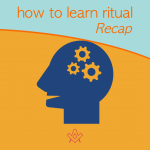 Now we are back in the Lodge room once again, maybe it is time to review how we learn and deliver ritual and look at different ways of improving that process. |
 Making an advancement in Masonic Knowledge can become far easier when you 'learn how to learn'. |
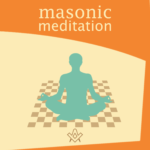 Learn how to practise Masonic meditation in a busy world with all its care and employments |
 Struggling to learn your ritual? Become a 5-Minute Ritualist with the aid of a book of the same name. |
 Day in the life of a Freemason As we start a new year, maybe start it with a new habit? |
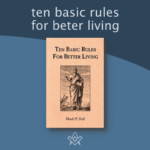 Ten Basic Rules For Better Living Ten Basic Rules For Better Living by Manly P Hall |
 How can we use masonic leadership skills to avoid confrontational situations? |
 How the Trivium is applied to Critical Thinking - {who, what, where, when} - {how} - {why} |
 The Seven Liberal Arts - why 'seven', why 'liberal', why 'arts'? |
 How to improve your public speaking skill with 6 techniques |
 Do you need to speak in public, or present Masonic ritual without notes ? |
 What are logical Fallacies and how to spot them |
 Share one easy tip to learn masonic ritual; Some good tips from Facebook followers |
 How can we use the 7 secrets of the greatest speakers in history |
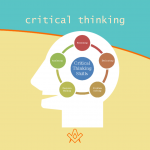 What is a critical thinker and what are their characteristics? |
 Share one personal skill Freemasonry helped you to improve? How can we make practical use of the lessons taught in Masonic writings? |
 An introduction to the art of public speaking - speak with confidence |
 Seven Liberal Arts and Sciences What do you know about Seven Liberal Arts and Sciences |
 Three Words That Will Change Your Life This article discuss a common situation found in many lodges - a difficulty in holding a conversation with a stranger. |
 Al - Khwarizmi live c750 - c820 is credited as being the father of Algebra, being asked what is Man, give his answer in an algebraic expression |
masonic knowledge
to be a better citizen of the world
share the square with two brothers

click image to open email app on mobile device
